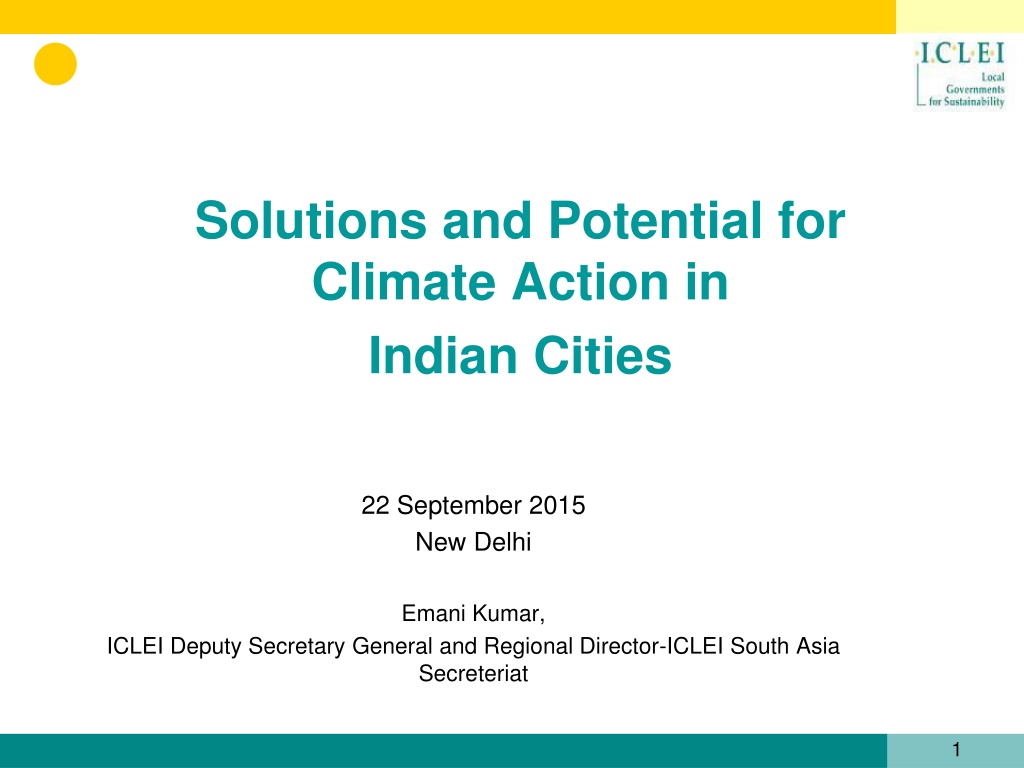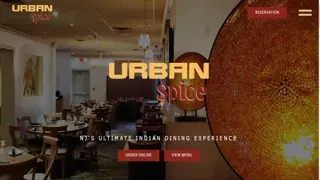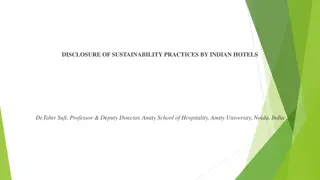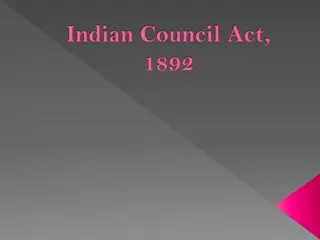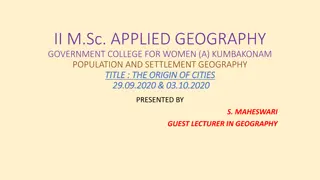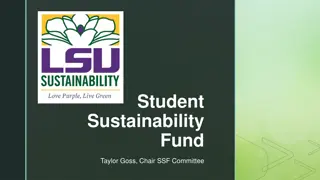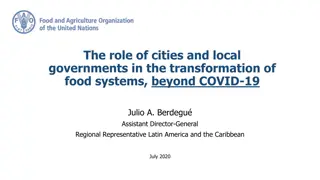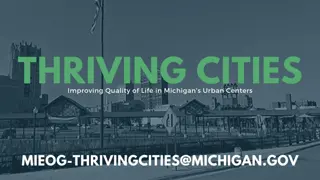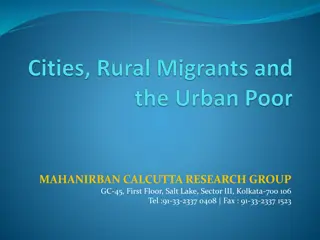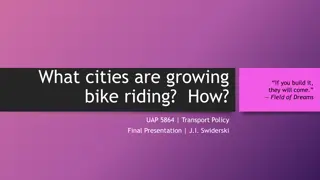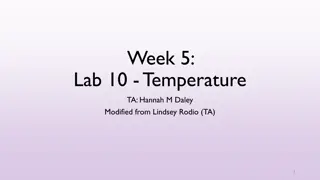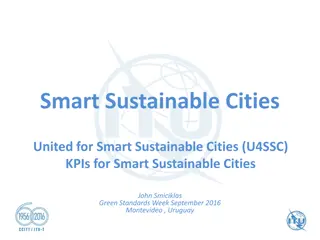Advancing Local Sustainability: ICLEI's Impact on Indian Cities
ICLEI, an international city network, supports over 1000 members across 86 countries in enhancing global sustainability through local actions. With a special focus on environmental conditions, ICLEI South Asia collaborates with cities in India and neighboring countries, providing resources, training, and project opportunities to drive climate action and sustainable urban development.
Download Presentation

Please find below an Image/Link to download the presentation.
The content on the website is provided AS IS for your information and personal use only. It may not be sold, licensed, or shared on other websites without obtaining consent from the author. Download presentation by click this link. If you encounter any issues during the download, it is possible that the publisher has removed the file from their server.
E N D
Presentation Transcript
Solutions and Potential for Climate Action in Indian Cities 22 September 2015 New Delhi Emani Kumar, ICLEI Deputy Secretary General and Regional Director-ICLEI South Asia Secreteriat 1
Introducing ICLEI-Local Governments for Sustainability (ICLEI) An international city network established in 1990 that advances local sustainability. ICLEI s mission is to build and serve a worldwide movement of local governments to achieve tangible improvements in global sustainability with special focus on environmental conditions through cumulative local actions. 1000+ members in 86 countries, representing 660 million people in mega-cities, super-cities, urban regions, large cities, small and medium- sized cities & towns. Also States / Provinces as members. Main activities: (i) Support our members with technical expertise, tools, guidance. (ii) Facilitate city peer exchange, support networking. (iii) Operate global processes (iv) Conduct international advocacy and representation. 2
ICLEI South Asia The South Asian regional chapter of ICLEI Local Governments for Sustainability. Working with South Asian cities with funding support from various national and international partners by offering opportunities: participation in programs and projects information services, training and conferences South Asian Region India Afghanistan Bhutan Nepal Pakistan Bangladesh Sri Lanka Maldives
ICLEI South Asia Members 66 INDIA (47) Ahmedabad Bhavnagar Bhopal Bhubaneshwar Chandrapur Coimbatore Dehradun North Delhi Gangtok Gandhinagar Guntur Gurgaon Guwahati Gwalior Howrah Hyderabad ASSOCIATE PARTNERS (4) All India Institute of Local Self Government (AIILSG) Punjab Municipal Infrastructure Development Company (PMIDC) Municipal Association of Nepal (MuAN) Local Government Authority , Maldives BANGLADESH (4) Rajshahi Dhaka Barisal Singra SRI LANKA (4) Matale Kandy Kurunegala Galle Pune Panaji Ichalkaranji Jabalpur Jamnagar Kalyan Dombivli Tenali Kishangarh Kolhapur Kolkata Kota Kurseong Madurai Mumbai Mysore Nashik Nagpur Rajahmundry Rajkot Salem Shimla Surat MALDIVES (1) Mal BHUTAN (2) Phuentsholing Thimphu Thane Tiruchirapally Tirupati Tiruppur Vadodara Vijayawada Vishakhapatnam Warangal Tirunelveli NEPAL (4) Kathmandu Pokhara Lalitpur Hetauda
Key Urban Sectors for GHG emission reduction intervention Roads & Transportation Urban poor & Slums Land use & Development Buildings Sewerage & Drainage Solid Waste Management Water Supply Street lighting
Solutions and Strategies across Sectors Roads & Transportation Land Use & Development Transport oriented development Street Design Guidelines High density, mixed use development Cycle laws, policies and Plans Prohibiting development in eco-sensitive zone Bicycle Share (Rental) Building codes for vulnerable areas Provision of Cycle Tracks Intelligent Transport System (Multi-modal Integration) Green building policy & incentives Conserve and develop green spaces, parks Parking Policy Pedestrian and non- motorized Zones Conserve water bodies Eco cabs - Rickshaw Management Car Sharing
Solutions and Strategies across Sectors Urban Poor & Slums Buildings Street Lighting Optimum Street lighting Design Replacement of Conventional Street lighting ballasts Solar Water Heaters Solar Water Heaters Solar PV power packs Solar PV systems Community solar cookers Micro Wind PV hybrids LED street lighting Retrofit Dimming & Auto ON/OFF Street lighting Controls Clean cook stoves Energy Efficient Lighting Energy efficient lighting and appliances Retrofit BEE star rated appliances Intelligent Street lighting Control System Voltage Controllers/ Regulators Solar powered LED street lighting, blinkers & traffic systems LED street lighting Passive Building design Decentralized waste water treatment systems Smart meters and controls Landscape design for minimum water use Community waste composting & biogas plants Low flow water faucets and taps Wastewater treatment & reuse
Solutions and Strategies across Sectors Sewerage & Drainage Water Supply Solid Waste Wastewater recycling and re-use Incentives for waste segregation at source Reduction of NRW Augmentation of groundwater resources Rejuvenation of water bodies Recycling & waste minimization Integrated Water resource management Energy efficient sewage pumping systems Planning for waste transfer stations Water reuse & recycling- industrial water supply Waste incineration with energy recovery Septage treatment Decentralized wastewater treatment systems Anaerobic sludge digestion from wastewater Proper pump-system design Bio-methanation Power saver installation in pump house Composting of organic waste Installation of variable speed drivers Landfill CH4 recovery Star rated pump sets and motors Public awareness Star rated transformers
Public and Non-Motorized Transport (NMT) Systems Shift to public transport- A city bus can carry 30 times more passengers, use half the energy and produce half the GHG emission compared to a car Findings from assessments carried out in 28 cities for NMT Lack of specific policy and budgetary allocation for NMT Lack of trained transport planners/engineers in city governments NMT data not collected and updated regularly
Renewable Energy in Buildings Solar Water Heating Systems (SWHS) 125 million kWh/year 102,848 tonnes of CO2e/yr Every 100,000 Households with 100 LPD SWHS For 100 liters per day capacity SWHS Energy saving: 1250-1500 kWh/year Cost ~INR 15,000 Rooftop area required :1.5 sq. metres Every 100,000 LPD SWHS in hospitals & hotels 1.3 million kWh/year 1000 tonnes of CO2e/yr Solar Photo-voltaic (SPV) Systems Every 100,000 kW of SPV systems in buildings 150 million kWh/year 123,00 tonnes of CO2e/yr For 1 kilowatt SPV system Energy generation: 1400-1600 kWh/year Cost of system~ INR 80,000- 100,000 Rooftop area required :10-12 sq. metres Reference: MNRE Solar Water Heater Market Assessment Report
Solar Cities Programme ICLEI South Asia assisting 15 Solar Cities 55 cities are now a part of the programme Detailed Action prepared targeting reduction in energy baseline over 5 years combination of RE and EE measures 8 model cities implementation support 15 pilot cities - receive partial implementation support Plan to be 10% through a CHAMOLI GOPESHWAR KOHIMA GURGAON AGRA - receive IMPHAL HOWRAH RAJKOT AIZAWL THANE BHUBANESWAR KALYANDOMBIVLI NAGPUR MEHBUBNAGAR COIMBATORE COCHIN 5 year timeline
Renewable Energy Potential in Cities Based on data for 10 Solar Cities GHG Emission Reduction (Tonnes of CO2e) 335,512 163,465 350,601 903,435 217,264 309,282 135,615 135,615 1,372,971 Investment Required (Lakh INR) 148,421 222,716 103,966 397,627 577,884 Energy Saving (Million kWh) Potential of RE (kilowatt) 156,870 244,942 Potential as per various technologies solar thermal applications in residential sector solar thermal applications in commercial sector solar thermal applications in industrial sector Solar thermal for government buildings Total solar photovoltaic in domestic sector solar photovoltaic in commercial sector solar photovoltaic in industrial sector solar photovoltaic in municipal sector Total other solar concentrating technologies in the domestic sector other solar concentrating technologies in the commercial sector Total biogas based systems in the commercial sector biogas based systems in the industrial sector Total waste to energy technology in municipal operations Total 409 72 241 423 56,036 9,883 32,958 57,993 51,942 7,166 41,173 48,139 53,858 1,145 256 35,085 3,229 9,701 3,781 51,796 7,619 1,180 8,799 2,046 932 2,977 24,500 24,500 24 71 28 378 56 19,295 52,169 20,554 34,764 36,181 13,348 6,602 19,949 2,809 1,881 4,690 1,466 1,839 3,305 767 10,375 11,143 17,388 17,388 9 64 15 7 22 167 167 Grand Total 1,777
Energy Efficient Street Lighting LED retrofit for 10,000 street lights through ESCO Model in Thane Energy saving- 45,00,000 kWh/year GHG emission reduction- 3,700,000 kg of CO2e LED retrofit for 522 street lights in slum areas of Thane Energy saving- 277,000 kWh/year GHG emission reduction- 228,000 kg of CO2e LED street lights, Rajkot Improving infrastructure and LED retrofits for 6,500 street lights Panaji Energy saving- 27,00,000 kWh/year GHG emission reduction- 100,000 kg of CO2e LED retrofit for 290 street lights in Rajkot Energy saving- 132,000 kWh/year GHG emission reduction- 100,000 kg of CO2e LED street lights, Thane Data from pilot projects being implemented by ICLEI South Asia under the Urban Low Emission Development Strategies Project
Bio-methanation of Solid Waste Bio-methanation plants generate energy in the form of biogas along with organic manure from organic waste Organic waste such as vegetables, fruits, flowers and slaughter house waste can be segregated from households, government canteens, hotels, institutions, markets Emission Reduction Potential for a 10 TPD bio- methanation plant Amount of Food Waste 10 tonnes per day Area Required 1200 sq. m. Biogas Generated 800 cu. m./day Energy equivalent to 760 LPG cylinders/month Methane gas produced 520 cu. m./day GHG emission reduction 395,000 kg of CO2e
Building Urban Climate Resilience Asian Cities Climate Change Resilience Network (ACCCRN) Sponsored by Rockefeller Foundation To implement the ICLEI ACCCRN process in approx 10 cities each in India, Bangladesh, Philippines and Indonesia Support cities to develop Climate Resilience Strategies Help identify funding opportunities for the implementation of the climate resilience strategies Networking and knowledge sharing opportunities regional & international Pilot Tested: Shimla, Bhubaneswar and Mysore Cities: Leh, Dharamsala, Mandi, Gangtok, Kurseong, Shillong, Nashik, Panaji, Nainital, Dehradun, Singra, Mongla and Barisal
Building Urban Climate Resilience Climate Change Adaptation Project Preparation and Financing in Urban India Moving from climate resilience strategies - project preparation access to finance ICLEI ACCCRN Process: Vulnerability Assessment and identification of resilience actions Project Preparation: Pre-feasibility studies preparation of detailed project reports Financing: Linkages to national schemes and other potential donors & defining appropriate mechanisms Phase I: Prioritisation Phase II: Pre Feasibility Study (PFS) Sponsored by ADAPT Asia Pacific Partners: ADAPT Asia Pacific & CDIA Duration : Feb 2014 to March 2015 Cities: Shimla, Bhubaneswar, Mysore ADB and USAID Adapt Asia - Pacific Program have agreed to fund the study for Integrated Drainage and Climate Change project for Mysore city based on the City Resilience developed by ICLEI South Asia pre-feasibility Strategy
Transformative Actions Program (TAP) Raised Ambition & Accelerated Climate Action Implementation Visibilization of potential and needs Mobilization of key actors The Compact of Mayors is the world s largest cooperative effort among mayors and city officials to reduce greenhouse gas emissions, track progress, and prepare for the impacts of climate change Local and subnational governments Climate Action Reporting (Compact of Mayors, Carbonn, ) Increased Access to Finance/Accelerated Climate Action Implementation Development Agencies TAP online platform Funding bodies and banks TAP Pavilion at COPs National governments (multi-level cooperation) T A P t h e p o t e n t i a l o f l o c a l a n d s u b n a t i o n a l c l i m a t e a c t i o n !
The 4 Action Pillars of the TAP Selection of 100 TAP frontrunner transformative local climate actions Every year Support in project proposal development Online platform that offers visibility to the potential of local climate action by presenting all transformative actions in a structured, unified format Basic information and communication facilitation platform for local/regional governments and funding bodies TAP Project Pipeline TAP Platform TAP Advocacy for Accelerated Climate Action (TAACA) TAP Pavilion Kick-off at COP21 At every future COP, the TAP will offer a physical space where TAP projects can present and exchange with other actors (national delegations, international donors, etc.) Mobilization of cities and regions sustained awareness-raising about the potential of local climate action, and its finance obstacles With focus on: multi-level governance, effective vertical integration, new financing mechanisms T A P t h e p o t e n t i a l o f l o c a l a n d s u b n a t i o n a l c l i m a t e a c t i o n !
Thank You! Emani Kumar, ICLEI Deputy Secretary General and Regional Director-ICLEI South Asia Secreteriat E-Mail: emani.kumar@iclei.org Websites: www.iclei.org www.southasia.iclei.org 20
